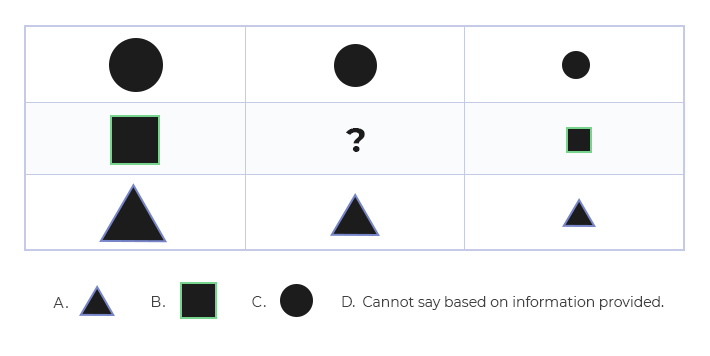Free Analytical Reasoning Test Questions Practice – 2025

What Is Analytical Reasoning?
Analytical reasoning, also known as logical reasoning, is a problem-solving method that focuses on identifying patterns and using logic to fill in missing pieces. This form of reasoning is slightly more detached from inferences and opinions, and places great emphasis on factual evidence. Analytical reasoning can be further simplified into two categories:
- Deductive Reasoning
Deductive reasoning, sometimes called top-down logic, is the formation of a specific conclusion from a general premise or, in some cases, multiple hypotheses. Deductive reasoning is best for situations with multiple variables that must be accounted for and handled.
- Inductive Reasoning
Inductive reasoning, also known as bottom-up logic, is the direct opposite of deductive reasoning as it forms plausible conclusions from a specific observation. Inductive reasoning works best when using context and practical intelligence to resolve an issue.
- Numerical Reasoning
Numerical reasoning is the ability to apply logic to problems that include data, charts and graphs. Someone who has strong numerical reasoning skills is proficient in basic mathematical functions, statistical interpretation, and algorithms to name a few.
- Abstract Reasoning
Abstract reasoning is the ability to identify patterns, extract main ideas, and analyze information. Abstract reasoning is an important factor of problem solving and decision making. This form of reasoning is complex and includes various aspects.
What Is an Analytical Reasoning Test?
Analytic reasoning tests are utilized by companies that wish to evaluate a candidate’s critical reasoning skills and their ability to pay attention to detail. This test is commonly administered for job seekers applying for mid- or high-level jobs that require a strength in mathematics. Management and human resource positions are also asked to partake in an analytical reasoning test so employers can measure their problem-solving capabilities. Depending on the role and company, participants may see one of three versions of the analytical reasoning assessment:
- Data
Most common in the financial industry, the data heavy version of the analytical reasoning test supplies applicants with graphs, charts and tables with subsequent questions. The math aspect of the data version is usually simple, so the problem-solving method can be highlighted and evaluated.
- Written
The written portion is used for leadership and management roles. Provided a passage, candidates must discern patterns and main ideas using the context and answer the multiple-choice questions that follow.
- Images
The analytical reasoning test that focuses on image-related questions slightly resembles the non-verbal reasoning test. The applicant is supplied puzzle-like questions containing shape sequences and objects and must find the missing piece.
How to Prepare for an Analytical Reasoning Test?
Analytical reasoning test can be difficult to study for because it examines your raw critical thinking skills. If you are looking to optimize and improve your score, the best way to prepare is running through sample questions or completing online practice tests. By doing this, you can become familiar with the idea of the content and the learn how to pace yourself under the time constraint. Due to the acumen required for each question, preparing for the time limit is essential because many candidates find themselves skipping and guessing at the questions rather than dedicating time and effort to them. It is also helpful to understand the qualities employers are looking for by administering these tests, that way you can narrow your preparation.
Analytical Skills Test Sample Questions
- Sally’s commute to work is twice as long as Joe’s. Joe’s drive is ten minutes longer than Beth’s. Sally’s commute is fifty minutes. CONCLUSION: Joe’s drive is fifteen minutes.
- The facts prove the conclusion.
- The facts disprove the conclusion.
- Cannot say based on the information provided.
- What shape comes next in the sequence?

Answers
- B
- B


